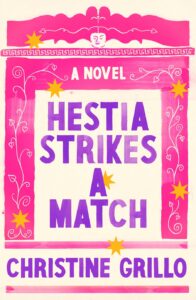
Therapeutic and Cathartic: On Self-Soothing With Satire
Christine Grillo Considers the Healing Potential of Political Humor
I’ve never thought of myself as funny. Serious, brooding, and melancholic—yes. Prone to catastrophize and dramatize? Yes.
And yet, when some friends and fellow writers read my first novel, Hestia Strikes a Match, several responded by texting me lines from the manuscript with laughing-crying emojis. One friend’s annoyed teenager asked her why she had to laugh so loudly while reading. Still another reader revealed that she usually hates sex in books but didn’t mind it in this one because of the humor. It dawned on me that people found the book funny. I thought: Really?
I can honestly say that I didn’t intend to make Hestia funny. At the beginning, my main intention was to blow off some steam. We were mid-Trump Administration, and I was disappointed in my fellow Americans. Disenchanted by democracy, I came to dread the Friday afternoon news bombs that surely raised the collective blood pressures of millions of Americans. My hair began, in earnest, to gray, and whether that was due to the natural aging process or to the president, I knew which one I blamed.
In an article he wrote for the New York Times in 1940, Charlie Chaplin, one of the great satirists, addressed criticism of his movie, The Great Dictator. He wrote, “As to Hitler being funny, I can only say that if we can’t sometimes laugh at Hitler then we are further gone than we think. There is a healthy thing in laughter, laughter at the grimmest things in life, laughter at death even.”
The great satirists punch up, never down, asking their readers to laugh at the expense of the most privileged.
How many times have we been told that laughter is the best medicine? I was trying to write a novel about how extreme ideologies can muck up love, family, and even friendship. Even though it had been a long time coming, it felt like the polarization had happened overnight. Suddenly, people’s high school friends seemed like creatures from another planet, and all those off-kilter brothers and uncles that we previously tolerated with good humor now espoused shocking political views. Anyone with a social media account experienced the polarization—or they watched it happen, comment by flaying comment. Stressful!
Write about your pain, people say. I tried that—and soon realized I was writing an angry, heartbroken novel about war, white nationalism, traitors, and insurrection. But I didn’t want to write about a depressing novel about how doomed we are. I wanted the book to be therapy. I wanted the kind of release that Charlie Chaplin wrote about. I began to self-soothe with satire.
Satire, and its cousin ridicule, are amazing tools, release valves for a pressure cooker. I grew up on Kurt Vonnegut, Catch-22, Dr. Strangelove, and 1984. The men who created these stories used parody, hyperbole, and caricature to illustrate the absurdity of the situations they wrote about. It’s easy for me to imagine the contempt they felt for the people and institutions they satirized. In my writing, I found it just as easy to ridicule the politicians and oligarchs for whom I felt contempt. It felt pretty good, actually.
As I experimented more with satire and ridicule, I realized that great satire seems to abide by an important rule: We may, and should, deride the people in power, but we do not deride the ordinary person following orders. I love that rule. The great satirists punch up, never down, asking their readers to laugh at the expense of the most privileged.
Punching up reassures the reader that the fault, the absurdity, is embedded in the power structures, and not in the people who are at the mercy of the power-hungry. In addition to being the compassionate choice, punching up helps you, the writer, form a more noble alliance with the peasants of the world, not the kings. Who would even want to be allied with the kings?
In earlier drafts of Hestia, I slipped up and made too much fun of the people who were not in charge. Lucky for me, one of my readers, a dear friend, pointed out scenes where I seemed to ignore the humanity of right-wing blockheads who went to rallies and protests. He suggested that I was making caricatures of the novel’s confederates. “It’s not just rednecks yanking at their crotches,” he said, and he was right. I believe that behind most neo-Nazis carrying confederate flags, there’s a mind-blowingly strategic campaign carved out of the political agendas of billionaires. The dude with the “Don’t tread on me” snake insignia did not dream up white nationalism on his own: he was incepted by a steady diet of well-funded propaganda.
Best to focus on the billionaires, I reminded myself. As I wrote, I chewed on the most vile or hypocritical real-life examples and then took them an inch or two further into hyperbole. For example, one thing that has bothered me since I was a child was the Confederate flag, especially when it flies right next to an American flag. Do the people who fly those flags side by side not realize that they cancel other out?
The less self-aware a character, the easier it is to make fun of them.
Apparently, they do not, and this lack of self-awareness is ripe for ridicule. In fact, the less self-aware a character, the easier it is to make fun of them. For me, comedy lives in that uncomfortable, cringey gap between what we (the readers) do know about a character, and what the character does not know (or does not care to acknowledge) about himself.
In real-life, there are few things more exasperating than a person whose actions and words contradict their alleged values—but in comedy, it’s gold. (Think Michael Scott of The Office.) In some ways, comedy is the moment before a character experiences cognitive dissonance, except that the character will probably never experience cognitive dissonance because they’re not self-aware enough for that.
In the Charlie Chaplin article, he goes on to say, “Laughter is the tonic, the relief, the surcease from pain. It is healthy, the healthiest thing in the world—and it is health-giving.” Kurt Vonnegut is supposed to have said, “Laughter and tears are both responses to frustration and exhaustion. I myself prefer to laugh.”
Writing Hestia became my medicine. It was a pleasure for me to make confederate governors squabble like children over currencies (Texas and Florida both want to print their own), plant public relations bombs on each other’s laptops, and die mysteriously, perhaps from poisoning like so many Putin henchmen. It was therapy for me to create a confederacy that builds a sister theocracy program in which it pairs up with Iran. And it was another form of self-soothing to, mid-way through the novel, show Texas trying to secede from the newly seceded confederacy, like someone in a taxi calling for a taxi.
I’d prefer not to need the medicine. I think I’d very much like to live in a world free of the hypocrisy and propaganda that make satire possible (although that probably would be a world free of the invasive species we know as Homo sapiens). I’d love to live in a country in which a novel like Hestia would seem so far-fetched that readers wouldn’t get the jokes. But, apparently, we do get the jokes. Sigh. One of my friends commented that every surreal situation in the novel is just a little realer than reality, and that it’s a comfort to share an eyeroll with someone. I’ll take it. A shared eyeroll can do wonders when you live in a ridiculous world.
__________________________________

Hestia Strikes a Match by Christine Grillo is available from Farrar, Straus and Giroux, an imprint of Macmillan, Inc.
Christine Grillo
Christine Grillo is a writer and editor covering food systems, agriculture, and climate change, whose nonfiction has been published in outlets such as The New York Times, The Atlantic: CityLab, Audubon, NextTribe, and Real Simple. Her short fiction has appeared in Story Quarterly, The Southern Review, and LIT. Hestia Strikes a Match is her debut novel.



















